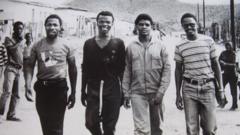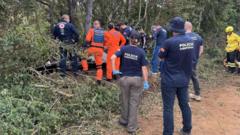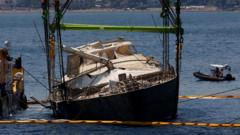In a significant move towards justice, South African President Cyril Ramaphosa has announced a judicial inquiry aimed at addressing allegations of interference in the prosecution of crimes committed during the apartheid regime, responding to decades of unaccounted atrocities.
South Africa Launches Inquiry into Apartheid-Era Prosecutions

South Africa Launches Inquiry into Apartheid-Era Prosecutions
President Cyril Ramaphosa initiates a judicial inquiry into allegations of political interference in the justice system regarding apartheid crimes.
South Africa is set to advance its pursuit of justice for apartheid victims with a judicial inquiry prompted by allegations of political interference in the prosecution of historical crimes. President Cyril Ramaphosa's announcement comes three decades post-apartheid, following a lawsuit filed by families of victims seeking accountability for their losses. The Truth and Reconciliation Commission (TRC), founded in 1996, previously revealed numerous human rights abuses during the apartheid era; however, few cases have progressed to legal proceedings. The inquiry was sparked by settlement negotiations related to a $9 million lawsuit by survivors and relatives of victims, spotlighting the alleged failure of successive governments to investigate these crimes fully.
Among the plaintiffs are family members of Fort Calata, one of the Cradock Four, who were brutally murdered by state forces in 1985. Despite confessions from former police officers to the TRC, no prosecutions were pursued, prompting widespread criticism of the African National Congress (ANC) for purported deals with the previous government. The presidency’s recent acknowledgment of ongoing allegations regarding the obstruction of justice underscores the contentious history surrounding apartheid prosecutions in South Africa. Details concerning the inquiry leader and its timeline are forthcoming.




















